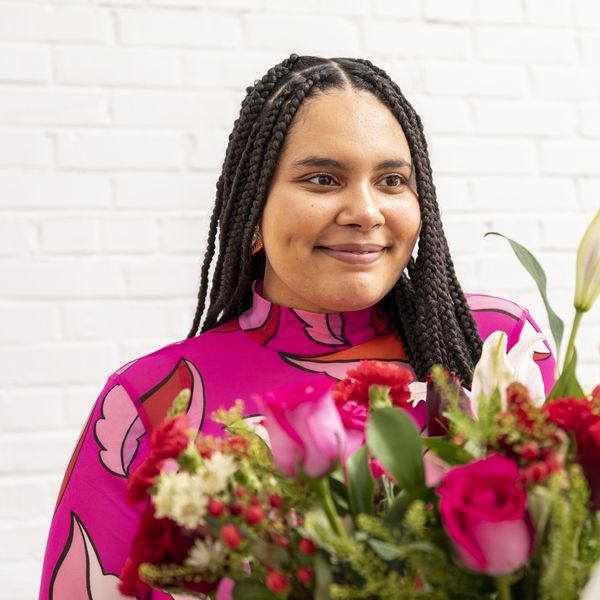
It's Time You Got Your Feelings Validated (More) In Your Relationships
While pretty much everything that I write is able to hit home for me on some level, this is the kind of article that is super personal because I'm someone who spent a lot of years having my feelings totally invalidated. It's a book unto itself, just why that was the case; however, I think the best way to narrow it down is I was a part of a generational curse of people who can totally relate. When you come from abuse—any kind of abuse, even neglect—your feelings have been invalidated. When you state your needs and they go ignored, your feelings are being invalidated. When you believe that you feel one way and someone tries to either manipulate or gaslight you into feeling something else, guess what—your feelings have just been invalidated.
This reality is problematic as all get out because, as you'll see in just a sec, feelings serve a purpose. It's one of the things that makes us human. We really can't process, gain clarity or evolve without them. So, if you happen to be someone who has gotten this far in this write-up and you already feel like you might tear up, please make the time to finish it all the way through. As someone who suffered for many years in this lane, I want to share with you some of what brought me to a place of pure freedom. Yes, in my feelings and in my relationships as it relates to feeling them.
Emotions. The Function of Feelings (in Relationships)
OK. Before we get into how you can get your feelings validated, let's first discuss what the purpose of having feelings actually is, to begin with. As far as feelings go, many therapists say that we all have seven basic feelings—joy, surprise, fear, disgust, anger, contempt, and sadness. Anything other than these is still tied to them on some level. Keeping this in mind, regardless of what we feel at any given time, all of our feelings basically exist in order to 1) protect us; 2) motivate us to make a decision; 3) manage stress; 4) help us to better understand other people, and/or 5) help others to understand us.
So, say for instance that one of your friends hurt your feelings (or pissed you off) because they violated your trust by sharing one of your secrets. Whether you are sad or angry, based on why we have feelings, those emotions transpired in order to protect you and help your friend to better understand you once you state where you are coming from.
Another example. Say that your boo came home with your favorite meal and a dozen roses. If you felt joy and surprise, that may motivate you to do something nice for him up the road. On the other hand, if you felt disgusted, perhaps you're protecting yourself on some level because he has a track record of only doing nice things when he's totally fumbled the ball in some way.
The reason why it's important to understand what our core feelings are and why they exist is so we can get a better grasp on what to do when a particular feeling comes over us instead of just remaining in the space without any real knowledge of how to move forward. Another reason why understanding our own feelings is so essential is because it helps us to recognize when they are being validated—or invalidated. This brings me to the next point.
What Does It Mean to Validate Someone's Feelings?
It's pretty common that when a couple goes to therapy, one of the issues that come up is poor communication. Because this is the case, something that a therapist/counselor/coach will oftentimes do is have one person verbally express a thought and then have the other person repeat back what they heard their partner say. This is an example of validating someone's feelings because validation is all about confirming something and one of my favorite definitions of confirm is "to acknowledge with definite assurance". When someone is validating another person's feelings, they are acknowledging that they definitely get—or are working to get—where the other person is coming from.
One of the biggest problems in a lot of relationships—any kind of relationship too—is people tend to spend more time either trying to get their own feelings validated that they end up ignoring the other person, or they are flippant and dismissive as hell about how someone else is feeling at any given time. Aside from either being disrespected as all get out, when you don't feel validated, how in the world can you even feel safe with that individual? This is why validating feelings is critical to the health and well-being of any relationship. Without it, there will always be some level of profound dysfunction.
Did Your Parents Validate Your Feelings in Your Childhood and Adolescence?
Now that there is some clarity on what it means to have your feelings validated, think back to your own childhood and adolescent years. Did your parents validate your feelings? I'll raise my hand in this class and say that most of my relatives did not. Even with the abuse that I experienced, oftentimes, their denial or ego mania tried to gaslight me into thinking that what happened to me "wasn't so bad" or that my memories were muddled. When you grow up that way, it can cause you to get into relationships with other people who also treat you in the same fashion. After all, your childhood is your foundation.
Without getting too deep into my own past—because you don't have the time and I don't have the energy…trust me—I think a really common example of invalidating a child's feelings is spanking them and then telling them not to cry. WTF? Let someone hit you multiple times and see how you feel. Pain hurts. Crying is a natural response. Telling a child that they cannot feel what they feel is invalidating them. And that is abusive.
So yeah, if you feel like you are currently in a cul-de-sac where either your feelings are constantly overlooked and/or, quite frankly, you don't know how to feel, reflect on when you were a kid and when you were a teenager. Did your parents and the other people around you honor you as an individual by letting you (respectfully) express your feelings? Did they acknowledge them without manipulation or unnecessary judgment? If so, consider yourself blessed. Those are the kind of individuals who end up being very self-aware; they tend to have healthy boundaries in their relationships too. Let's keep going.Do You Express Your Feelings and Your “Big Girl Emotions”, Now?
Some of you may have caught an article that I wrote for the platform a few years back entitled, "What GROWN Women Consider Great Sex To Be". A part of the reason why I wrote it is that, hopefully, as we age, we also mature. So yes, the way that we process sex in our 20s should be very different once we hit our 40s (whether we are married or not). Well, the same thing applies to our emotions. When my almost-two-year-old goddaughter is aggravated, she's gonna cry, yell and/or attempt to throw something. She's not old enough to understand that there are other ways to convey emotions. It's awesome that her parents are mature enough in their own development that they get that because there is nothing worse than seeing a child at a grocery store throwing a temper tantrum as their parents do the same in return. The child and the parent should be responding very differently because one should be way more self-aware than the other.
The same thing applies to how we express our feelings as adults, regardless of the person we're expressing our emotions to. Matter of fact, wisdom teaches that as we continue to evolve, we should definitely know the difference between having feelings and being an overly emotional kind of person.
I'll give you an example. One of my former clients? She used to wear me all the way out because whenever someone disappointed her, she would spend a lot of her time cussing and yelling at me as if I was the source of her disdain. When I would ask her if she shared her feelings with the actual cause of her issue, her answer was either that she acted like nothing was wrong or she simply cut them off (check out "Why I Don't "Cut People Off" Anymore, I Release Them Instead"). As I dug deeper, I realized that she was so emotionally stunted and used to her feelings being disregarded that she didn't even know how to go about getting her feelings validated. She would rather just run through relationships than do the work to establish healthy connections.
This is one example of what it means to be overly emotional. When you don't understand feelings, their purpose, and how to express them in a productive kind of way, you end up being all over the place and oftentimes, ultimately, alone.
How Good Are You at Validating the Feelings of Others?
Something that I am a huge believer in is the importance of "taking inventory" in friendships. The reality is that just like married people grow and change over time, friends do too. That's why it's poor form to assume that needs and expectations will always remain the same. Matter of fact, one of my closest friends and I had a chat about this very thing not too long ago. She semi-recently signed a deal that is going to take a lot more of her time which means we both have to make adjustments in order to still engage one another. We used to talk constantly, so I've had to be intentional about paying close attention when she shares how tired she is or how she needs time to herself. Even when she says that she's fine being on the phone for an hour, I've had to "love her enough" to sense when she's beat and initiate getting off of the phone myself—whether she says she's good with staying on longer or not.
Honestly, 10 years ago, I probably wouldn't even think this deeply. It goes back to my childhood angst because when folks are invalidating your emotions, you don't really care all that much about validating theirs. Yet the more I heal, the more important it is to definitely acknowledge where others are coming from. Trust me, the more you tap into other people's emotional needs, the more inclined they are to return the favor.
5 Steps Towards REQUIRING That Your Feelings Get Validated More Often
I know this was kind of a lot. I do hope that it helped to provide a few ah-ha moments, though, if you happen to be someone who wonders why your feelings don't get validated (acknowledged) as much as they probably should. That said, I think it would be pretty irresponsible of me to break all of this down and not offer up a few tips for how you can start getting your feelings validated in your relationships more often, moving forward.
Step 1: Make sure YOU know how YOU feel first.
It's next level maturity to be able to control yourself enough that when you feel certain emotions (like anger or disgust), you take a moment (or 10) to get a hold on why you feel that way and what that feeling is give you a heads up on. For instance, if your boss has you wanting to throw something straight at their head, why is that? Did they not keep their word? Do you feel taken for granted? Are they dismissive of your requests? Remember that feelings can help to protect us and get people to better understand us. Knowing why you feel what you do and the purpose that it serves can help you to communicate your emotions better.
Step 2: Express your feelings in the way that you would like them to be expressed to you.
I've said it before and I'm sure I will say it a million more times before I transition on—I can't stand to see men or women put their hands on someone. I also think it's ridiculous to hear men or women yelling at each other. Regardless of how you feel at any given time, remember that feelings are to bring about a level of understanding. No one is trying to get what you're saying, sympathize or empathize with you or even make a real connection with you if you are wilin' out here.
It's always important to remember the Golden Rule in the sense that the way that you want someone to express their feelings to you is the way that you should express your feelings to them.
Step 3: REQUIRE that your feelings be validated.
Some people struggle with requiring things of others because they feel like it comes off as being a demand. Shoot, I don't because a requirement is a need and if someone isn't willing to meet your basic needs, why are they in a close proximity when it comes to your life in the first place? Another example. There is someone from my past who constantly reached out whenever they were upset with someone else or, in hindsight, needed their ego stroked. Because I was still wounded from having my own feelings invalidated, I kept rising to the occasion. Yet whenever I would bring to their attention something that they did (or didn't do) that hurt me, they would literally act like I said nothing at all.
I took this for years until one day, I wrote them about the pattern and how I wasn't going to tolerate it anymore. In true "them" fashion, they didn't respond and when I ran into them months later, they acted like I never said anything. "Old Shellie" would've probably cussed them out right there in the mall. "New Shellie" greeted them, had small talk and walked away knowing that they didn't deserve for me to be a close friend to them; casual acquaintances is more than fine. The same thing can apply to you. Your need for folks to acknowledge where you are coming from isn't asking too much. If they are don't want to meet the need, make adjustments in your interaction with them. For your own protection and well-being.
Step 4: Avoid over-indulging your feelings.
You know how sometimes a child will continue to scream until either you give them what they want or they wear themselves out? A lot of adults are the same way. It's a harsh reality but you can't make people do anything that they don't want to do. Once you're in touch with your feelings and the purpose behind them and you share that with someone else, it's up to them to validate you—or not.
If they couldn't, say, care less that you are sad, staying sad changes nothing. All it does it make you feel worse. Be intentional about honoring your emotions and working through them rather than wallowing in them. Again, already being sad and then getting sadder because someone doesn't choose to see you is futile. Besides, you deserve better.
See things for what they are and then move on to my final suggestion.
Step 5: Be solutions-oriented.
You know something else that self-aware people do? They find a way to validate their own feelings while working towards how they can find a solution within them. Folks who lack self-awareness will just stay in their feelings with no plan or goal for shoot…ever, if they can. It took me a long time to break the cycle that I grew up in and was surrounded by. But man, I don't have one relationship now where I am not able to express my feelings and not feel heard/validated. I try and make sure that everyone in my world—personally and professionally—can say the same thing about me. Because when the "problem" of me feeling some type of way comes up, my peeps and I work together to find a solution—even if it's just to understand where I'm coming from.
Bottom line, you have feelings for a purpose and they deserve to be validated. Settle for nothing less, sis. No relationship works, in a healthy way, when you settle. Straight up. I would know.
Join our xoTribe, an exclusive community dedicated to YOU and your stories and all things xoNecole. Be a part of a growing community of women from all over the world who come together to uplift, inspire, and inform each other on all things related to the glow up.
Featured image by Shutterstock
Different puzzle pieces are creating bigger pictures these days. 2024 will mark a milestone on a few different levels, including the release of my third book next June (yay!).
I am also a Professional Certified Coach. My main mission for attaining that particular goal is to use my formal credentials to help people navigate through the sometimes tumultuous waters, both on and offline, when it comes to information about marriage, sex and relationships that is oftentimes misinformation (because "coach" is a word that gets thrown around a lot, oftentimes quite poorly).
I am also still super devoted to helping to bring life into this world as a doula, marriage life coaching will always be my first love (next to writing, of course), a platform that advocates for good Black men is currently in the works and my keystrokes continue to be devoted to HEALTHY over HAPPY in the areas of holistic intimacy, spiritual evolution, purpose manifestation and self-love...because maturity teaches that it's impossible to be happy all of the time when it comes to reaching goals yet healthy is a choice that can be made on a daily basis (amen?).
If you have any PERSONAL QUESTIONS (please do not contact me with any story pitches; that is an *editorial* need), feel free to reach out at missnosipho@gmail.com. A sistah will certainly do what she can. ;)
ItGirl 100 Honors Black Women Who Create Culture & Put On For Their Cities
As they say, create the change you want to see in this world, besties. That’s why xoNecole linked up with Hyundai for the inaugural ItGirl 100 List, a celebration of 100 Genzennial women who aren’t afraid to pull up their own seats to the table. Across regions and industries, these women embody the essence of discovering self-value through purpose, honey! They're fierce, they’re ultra-creative, and we know they make their cities proud.
VIEW THE FULL ITGIRL 100 LIST HERE.
Don’t forget to also check out the ItGirl Directory, featuring 50 Black-woman-owned marketing and branding agencies, photographers and videographers, publicists, and more.
THE ITGIRL MEMO

I. An ItGirl puts on for her city and masters her self-worth through purpose.
II. An ItGirl celebrates all the things that make her unique.
III. An ItGirl empowers others to become the best versions of themselves.
IV. An ItGirl leads by example, inspiring others through her actions and integrity.
V. An ItGirl paves the way for authenticity and diversity in all aspects of life.
VI. An ItGirl uses the power of her voice to advocate for positive change in the world.
Let’s make things inbox official! Sign up for the xoNecole newsletter for daily love, wellness, career, and exclusive content delivered straight to your inbox.
You've Never Seen Luke James In A Role Quite Like This
Over the years, we've watched Luke James play countless characters we'd deem sex symbols, movie stars, and even his complicated character in Lena Waithe's The Chi. For the first time in his career, the New Orleans-born actor has taken on a role where his signature good looks take a backseat as he transforms into Edmund in Them: The Scare—a mentally deranged character in the second installment of the horror anthology series that you won't be able to take your eyes off.
Trust us, Edmund will literally make you do a double take.
xoNecole sat down with Luke James to talk about his latest series and all the complexity surrounding it—from the challenges taking on this out-of-the-box role to the show's depiction of the perplexing history of the relationship between Black Americans and police. When describing the opportunity to bring Edmund's character to life, Luke was overjoyed to show the audience yet another level of his masterful acting talents.
"It was like bathing in the sun," he said. "I was like, thank you! Another opportunity for me to be great—for me to expand my territory. I'm just elated to be a part of it and to see myself in a different light, something I didn't think I could do." He continued, "There are parts of you that says, 'Go for it because this is what you do.' But then also that's why it's a challenge because you're like, 'um, I don't know if I'm as free as I need to be to be able to do this.' Little Marvin just created such a safe space for me to be able to do this, and I'm grateful for everything I've been able to do to lead to this."

Them: The Scare, like the first season, shines a light on the plight of Black Americans in the United States. This time, the story is taking place in the 1990s, at the height of the Rodney King riots in Los Angeles. While the series presents many underlying themes, one that stands out is Black people and the complicated relationship with the police. "For the audience, I think it sets the tone for the era that we're in and the amount of chaos that's in the air in Los Angeles and around the country from this heinous incident. And I say it just sets the tone of the anxiety and anxiousness that everybody is feeling in their own households."
James has been a longtime advocate against police brutality himself. He has even featured Elijah McClain, the 23-year-old Colorado man who died after being forcibly detained by officers, as his Instagram avatar for the past five years. So, as you can imagine, this script was close to his heart. "Elijah was a soft-loving oddball. Different than anyone but loving and a musical genius. He was just open and wanted to be loved and seen."

Luke continued, "His life was taken from him. I resonate with his spirit and his words...through all the struggle and the pain he still found it in him to say, 'I love you and I forgive you.' And that's who we are as people—to our own detriment sometimes. He's someone I don't want people to forget. I have yet to remove his face from my world because I have yet to let go of his voice, let go of that being [because] there's so many people we have lost in our history that so often get forgotten."
He concluded, "I think that's the importance of such artwork that moves us to think and talk about it. Yes, it's entertaining. We get to come together and be spooked together. But then we come together and we think, 'Damn, Edmund needed someone to talk to. Edmund needed help... a lot [of] things could have been different. Edmund could have been saved.'
Check out the full interview below.
Luke James Talks Ditching Sex Symbol Status For "Them: The Scare", Elijah McClain, & Morewww.youtube.com
Featured image by Getty Images









